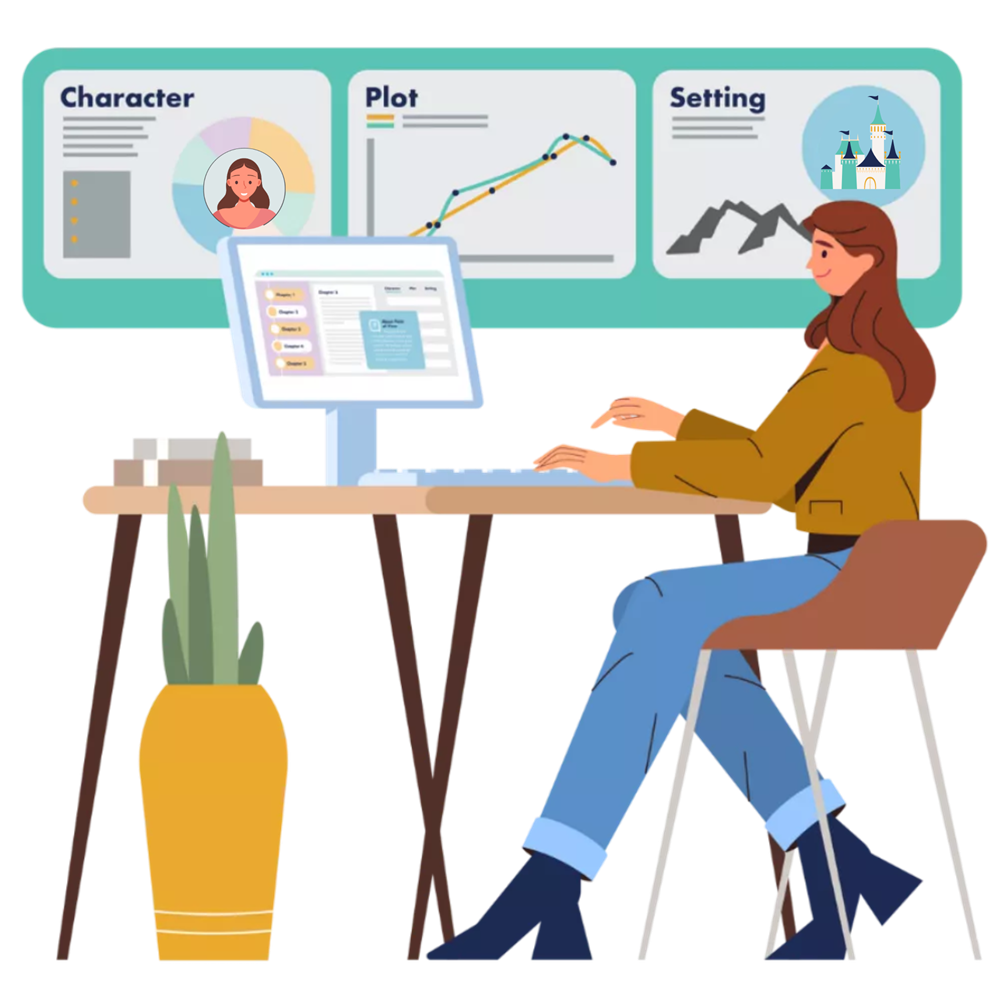
A person can be agreeable, daft, motivated, greedy, unpredictable, articulate, or something else.
All of these words are adjectives. Adjectives modify a noun or pronoun by providing more information about its qualities or characteristics.
Using the right adjective to describe a person or character is essential to help other people understand exactly who that person is, how they present themselves, and how they interact with others.
But it can be difficult to know what the best adjective is. That’s why we’ve created this list of adjectives with their definitions that you can use to describe a person of character in your story. We have split the adjectives into different categories, including positive, negative, and professional, to make it easier for you to find the perfect one.
Take a free trial of Fictionary today and take your story to the next level.
How Do You Select the Best Adjective to Describe Someone?
The best way to pick an adjective to describe a person or character is to know them really well.
Think about their most defining personality traits, hobbies, and physical features. Observe their actions, speech, and interactions with others. Paint a clear picture of who they are in your mind.
Then pick a variety of adjectives that describe each part of who they are. Decide if you want your adjectives to be positive, negative, or neutral. For example, they may be reliable, sporty, and head-strong. Or, they may be eccentric, unpredictable, and observant.
And finally, make sure to look at synonyms for each of your words to ensure you have the most accurate and context-appropriate word.
Positive Words That Describe People
Let’s start with a list of positive adjectives you can use to describe people and characters. These are great to use for friends, family, heroines, heroes, and your protagonist.
- Adaptable: Easily adjusts to changes
- Affectionate: Shows love and care
- Agreeable: Pleasant and cooperative
- Attentive: Pays careful attention
- Authentic: True to oneself
- Brave: Courageous in difficult situations
- Calm: Relaxed and untroubled
- Candid: Honest and straightforward
- Caring: Shows empathy and concern
- Cheerful: Happy and optimistic
- Compassionate: Feels and shows sympathy
- Creative: Imaginative and innovative
- Curious: Eager to learn and explore
- Daring: Bold and adventurous
- Earnest: Sincere and serious
- Easygoing: Relaxed and carefree
- Empathetic: Understands others’ feelings
- Energetic: Full of energy
- Faithful: Loyal and reliable
- Fearless: Unafraid and bold
- Generous: Willing to give freely
- Gracious: Courteous and kind
- Honest: Truthful and sincere
- Humorous: Funny and entertaining
- Intuitive: Understands instinctively
- Joyful: Full of happiness
- Just: Fair and righteous
- Kind: Caring and considerate
- Loyal: Faithful and reliable
- Magnanimous: Generous and forgiving
- Open-minded: Receptive to new ideas
- Optimistic: Positive outlook on life
- Passionate: Shows strong enthusiasm
- Philosophical: Thoughtful and wise
- Sincere: Genuine and honest
- Sociable: Enjoys social interactions
- Thoughtful: Considerate of others’ needs
Funny Adjectives to Describe a Person
This is my favorite adjectives list because it contains some great funny adjectives you could use to describe jokers, light-hearted, and quirky people.
- Absurd: Ridiculous and nonsensical
- Bizarre: Strange and unusual
- Blundering: Often makes silly mistakes
- Bonkers: Crazy in a fun way
- Cheeky: Playfully mischievous
- Clownish: Acts like a silly clown
- Cockamamie: Ridiculous and silly
- Corny: Silly in a predictable way
- Daft: Silly and foolish
- Daffy: Silly and quirky
- Dippy: Silly and scatterbrained
- Dopey: Foolish and clueless
- Eccentric: Odd and unconventional
- Flaky: Unreliable and eccentric
- Goofy: Silly and playful
- Harebrained: Foolish and ridiculous
- Hilarious: Extremely amusing
- Kooky: Strange in an endearing way
- Ludicrous: Absurdly ridiculous
- Loopy: Crazy and silly
- Madcap: Impulsive and funny
- Nutty: Crazy in a fun way
- Outlandish: Bizarre and unconventional
- Preposterous: Utterly ridiculous
- Quirky: Unconventionally amusing
- Ridiculous: Deserving of mockery
- Silly: Lacking seriousness
- Wacky: Funny in a crazy way
- Whimsical: Playfully quaint
- Zany: Amusingly unconventional
Strong Adjectives to Describe a Person
If your character or the person you are describing is strong with a big personality, here are some adjectives for you to pick from.
- Assertive: Self-assured and bold
- Authoritative: Commanding respect
- Brave: Courageous in the face of danger
- Charismatic: Possessing great personal charm
- Commanding: Exuding authority
- Courageous: Facing fear with bravery
- Daring: Willing to take risks
- Decisive: Makes decisions confidently
- Determined: Strongly motivated
- Dominant: Exerts control and influence
- Driven: Motivated to achieve goals
- Dynamic: Energetic and forceful
- Energetic: Full of energy and life
- Forceful: Strong and assertive
- Formidable: Inspiring fear and respect
- Independent: Self-reliant and autonomous
- Influential: Exerting great influence
- Innovative: Creative and original
- Intrepid: Fearlessly adventurous
- Invincible: Impossible to defeat
- Mighty: Possessing great strength
- Motivated: Driven to achieve
- Passionate: Strongly enthusiastic
- Proactive: Takes initiative and action
- Resilient: Quickly recovers from difficulties
- Resolute: Firmly determined
- Spirited: Full of energy
- Steadfast: Firm and unwavering
- Strong-willed: Resolute
- Tenacious: Persistent and determined
- Uncompromising: Firm and resolute
- Unstoppable: Impossible to defeat
- Valiant: Courageously brave
- Visionary: Forward-thinking and innovative
Negative Descriptive Words for People
Now we are going to look at a selection of negative adjectives you can use to describe people and characters.
- Arrogant: Overly self-important
- Blunt: Insensitive and direct
- Callous: Unfeeling and insensitive
- Cynical: Distrustful of others’ motives
- Deceitful: Dishonest and misleading
- Demanding: Difficult to please
- Dishonest: Not truthful or sincere
- Egotistical: Excessively self-centered
- Fickle: Frequently changing loyalties
- Greedy: Excessively desirous of wealth
- Gullible: Easily deceived
- Harsh: Cruel and severe
- Hostile: Unfriendly and antagonistic
- Hypocritical: Pretending to be virtuous
- Impatient: Unable to wait patiently
- Inconsiderate: Thoughtless towards others
- Indecisive: Unable to make decisions
- Intolerant: Unwilling to accept differences
- Irresponsible: Not accountable or reliable
- Jealous: Envious of others’ success
- Lazy: Unwilling to work hard
- Manipulative: Controlling others deceitfully
- Moody: Frequently changing moods
- Narcissistic: Excessively self-admiring
- Neglectful: Failing to care properly
- Obnoxious: Extremely unpleasant
- Overbearing: Bossy and domineering
- Paranoid: Excessively distrustful
- Pessimistic: Always expecting the worst
- Petty: Focusing on trivial details
- Prejudiced: Holding biased opinions
- Reckless: Acting without caution
- Rude: Impolitely disrespectful
- Selfish: Concerned only with oneself
- Stubborn: Unwilling to change opinion
- Vindictive: Desiring revenge
Professional Words to Describe a Person
Here are a selection of adjectives you can use in a professional setting to describe people’s skills and attitudes in the workplace.
- Adaptable: Easily adjusts to changes
- Ambitious: Driven to achieve goals
- Analytical: Skilled at logical thinking
- Articulate: Communicates effectively
- Capable: Highly skilled
- Collaborative: Works well with others
- Committed: Dedicated to tasks
- Conscientious: Diligent and thorough
- Creative: Innovative and imaginative
- Decisive: Makes decisions confidently
- Dependable: Reliable and trustworthy
- Diligent: Hardworking and meticulous
- Diplomatic: Tactful in interactions
- Enthusiastic: Shows intense excitement
- Ethical: Adheres to moral principles
- Experienced: Skilled through practice
- Flexible: Easily adapts to changes
- Focused: Concentrates on tasks
- Hardworking: Puts in great effort
- Honest: Truthful and sincere
- Innovative: Creative and forward-thinking
- Knowledgeable: Well-informed and educated
- Leader: Guides and inspires others
- Logical: Reasonable and rational
- Meticulous: Pays attention to details
- Motivated: Driven to succeed
- Organized: Structured and systematic
- Patient: Tolerant and understanding
- Perceptive: Insightful and observant
- Proactive: Takes initiative and action
- Punctual: On time and prompt
- Resourceful: Clever and inventive
- Responsible: Accountable and reliable
- Strategic: Plans effectively for future
- Supportive: Offers encouragement
- Talented: Naturally gifted
Describing Words for People’s Style
Here are some adjectives you can use to describe people’s physical appearance and personal style. These words positive, negative, and neutral.
- Attractive: Pleasing to the eye
- Charming: Pleasantly attractive or delightful
- Classy: Elegant and sophisticated
- Colorful: Bright and vibrant attire
- Cute: Endearingly attractive
- Dapper: Neatly dressed and stylish
- Dashing: Attractive and adventurous
- Distinguished: Commanding respect in appearance
- Elegant: Graceful and stylish
- Fashionable: Conforms to current trends
- Flashy: Bright and eye-catching
- Glamorous: Attractive in a showy way
- Graceful: Showing elegance and poise
- Handsome: Good-looking and attractive
- Immaculate: Perfectly clean and neat
- Modern: Up-to-date and trendy
- Neat: Clean and well-groomed
- Polished: Refined and sophisticated
- Posh: Luxuriously elegant and fashionable
- Refined: Cultivated and sophisticated
- Rugged: Strong and attractively rough
- Sleek: Smooth and glossy
- Smart: Neat and stylish
- Sophisticated: Worldly and elegant
- Sparkling: Shiny and bright
- Sporty: Casual and athletic-looking
- Stately: Impressive in appearance
- Stylish: Fashionably elegant
- Suave: Smoothly charming
- Tasteful: Shows good aesthetic judgment
- Trendy: Very fashionable and up-to-date
- Vibrant: Bright and full of energy
- Youthful: Appears young and lively
Tips for Using Adjectives in Writing
This is just a small selection of the adjectives you could use to describe a person, but it’s a great start to get your creative juices flowing. If the exact adjective you need isn’t here, then take the one that is the closest fit and check for synonyms.
Once you’ve found the right words, here are five tips for using adjectives effectively in writing:
- Use sensory details: Incorporate adjectives that appeal to the five senses to engage your readers and create vivid descriptions.
- Show, don’t tell: Rather than stating something outright, use descriptive adjectives to explain how something looks, tastes, sounds, smells like, or feels. This helps the reader fully visualize the scene.
- Avoid overuse: Use adjectives sparingly because using too many can feel cluttered and unnatural.
- Be original: Keep your writing fresh by using less common adjectives and avoiding cliches.
- Edit and edit more: Nobody’s first draft is perfect. So after writing, ensure to review all your adjectives, swap out common ones with more specific ones, and remove all those that don’t pack a punch.
And you need to edit more than just your adjectives. Perfect your story arc, craft compelling characters and polish your setting with Fictionary’s automated story editing software. Happy writing!



